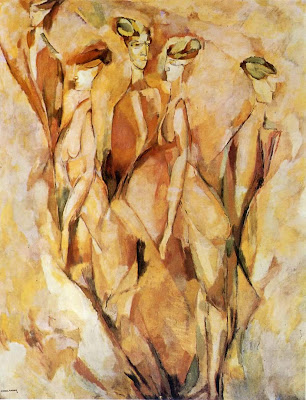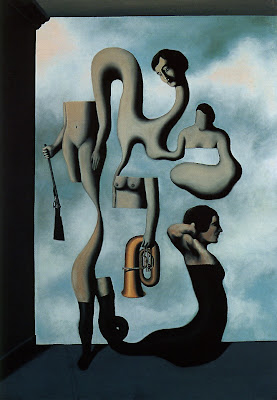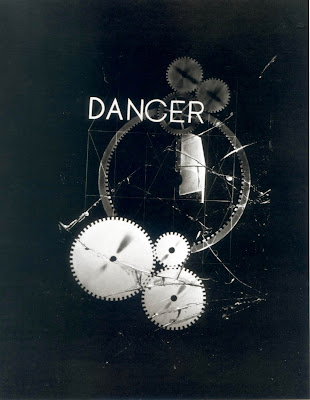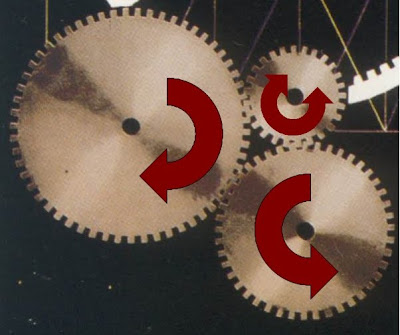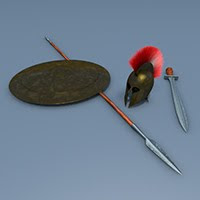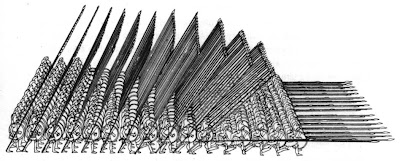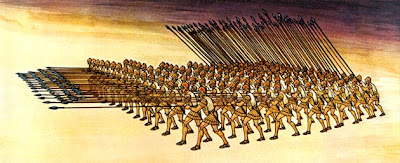May I thank Clifford Duffy for sharing his creations.
Without words, without things: so, what else would remain? Heidegger famously wrote, "where words break off, no thing may be." If we did not have the word-meaning for 'beside', would our world have things one-beside-another? If we cross-out all our word-meanings and grammatical functions (like predication, 'The tulip is a flower, is yellow,') can anything in our world remain? Not only would all the namable things be crossed-out, so too would the possibility of making designations; for, to designate something, we need to differentiate it from other things in its context or against which it would be counter-defined (we might need 'dark' to know 'light'). But without grammatical-functions like predication, negation, and prepositional relation (dark lingers
before light), can we even begin to have a world of things?
How might we further this line of thinking? Regarding the sentence, "where words break off,
no thing may be," let's draw our attention to
no thing. We could think of it as
nothing, or perhaps as a 'no-thing.' What would a no-thing be? It is not a thing, but it is not nothing, either. And from this sentence, we would assume that a no-thing appears when words 'break off'. It could be that the no-thing was there even while there were words, but we only notice it when the words break-off and leave the no-thing standing by itself.
Such observations might be of interest when we consider the mechanics of language. When driving and we see a stop signal, our feet hit the brake without a second thought. It is as if there is no need to translate the meaning of the sign: the same way that one gear need not think about another gear in order for them to turn one another, our bodies too are like gears that react automatically to the signs we see. But first recall when we initially learned how to drive. When we saw the red, we did not automatically stomp our feet without hesitation. There were so many possibilities available. Where exactly is the brake pedal? We have to hit it without looking for it? But is not the gas pedal right next to it? If we hit the gas accidentally, our situation could become unpredictably catastrophic. Our body does not yet have the word-thing 'red means stomp on brake'. Instead, we have something much more interesting. But after we learn the meaning of the sign, there is no longer anything there. We hit the brake without the red, the stomp, or the stopping entering our attention. These are all very concrete real things in our world, and they are so much a part of our world that we do not notice them. But before they existed, before we had the word-meanings for these parts of our world, they were so much more, they were infinitely more, they could have been anything! Red could very easily have meant catastrophe as much as total safety and orderliness. In this case, words broke-off, but there was not nothing, nor was there a concrete something. Rather, there was a
no-thing, an infinite non-something, a something = x to the power of infinity, or we might say, a thing = x to the n
th power.
Recalling again us first learning to drive, we had to learn a new language, of sorts, the language of traffic signs, both customary ones, like traffic-lights and official street signs and signals, and also contextual signs, like seeing a fluid on the road and knowing this signals to us to slow down so not slip-off the road. But when first acquiring this 'vocabulary', we learn that the language-meanings we already know do not always help. We need to learn the new language, yet we are lost at first because we try to apply the languages we already know. Perhaps we first considered those mechanical reactions we knew from the language of bike-riding, but back-peddling or gripping the steering wheel does not brake the automobile. So when first learning to brake the car, we exhaust all the 'words' we have in the 'languages' we know, running through all the things already in our world. That does not mean only nothing remains! There is an infinity at the edge of these limits!: catastrophe or safety from death, happening by so many unforeseeable ways. When we exhaust the words of our language and the things of our world, what remains is infinite no-thingness.
So let's not interpret this no-thing as an absence. It could hardly be so! How is something infinite also something absent? This means then that when Heidegger speaks of 'saying,' which is also an 'unsaying,' we need not think that language (in how we feel it immediately) has anything to do with something missing from it. When first learning how to brake a car, it is not that we face a nothing or an absolutely foreign otherness. Language becomes exhausted. All its possibilities have run-through and run-out. At last!: the birth of the full and immediate no-thing, the absolute thing = x
n. Please note the difference between thing = x and thing = x
n (or no-thing = x
n. Also consider the formulations sign = x and no-Sign = x
n.) An extensional meaning refers to the things in the set it refers to. Oedipus, recall, married his mother. So 'son of Jocasta' and 'husband of Jocasta' refer to the same thing, the same object in a set, which in this case is a set with one member, the thing we also call Oedipus. But what happens in our minds and bodies when we say to ourselves, 'The son of Jocasta is the husband of Jocasta'? This does not give us the same feeling as when we say 'Oedipus is Oedipus' or 'Oedipus is Jocasta's son', for example. This is because even though both 'son of Jocasta' and 'husband of Jocasta' extend into the same meaning-reference (Oedipus), they do not at all intend the same meaning. The words and propositions in our language have intensional meanings as well as extensional ones. It is hard to define what an intensional meaning really is, but we might think of it as the impulses and tendencies for a meaning to want to reach-out into different suggested or 'virtual' implications. It is implicit rather than explicit, and in a way, it is inexplicably implicit, because it is difficult to formalize (those with superb analytical philosophical skills can in fact formalize this, as for example the remarkable contributions
Roger Vergauwen has made to formalized intensional logic and semantics). So 'thing = x' might suggest that there is an unknown thing, or an empty set; in the case of sign = x, we might at first think of it as an empty reference, or we may even regard it to indicate that at the core of all signification there is absence, in the sense that absence is always a prerequisite condition for representation (for otherwise, if the thing were present, it would be mere presentation and not representation). But this is to regard 'x' only in an extensional way. When however x is to the nth power, this means that while no extensional meaning is designated, there is an infinity of virtual intensional meaning. It is not just that the x is an empty place-marker meaning that it could be filled by anything, but rather that it virtually is tending with infinite power to mean a great variety of things, like how the no-thing/no-sign of learning to brake a car virtually implies so many meanings, ranging from utter disaster to complete safety to so much else that it may prove itself to mean.
So let's consider a Deleuzean reading of Heidegger's philosophies of language, rather than one that follows a more post-structuralist leaning (I tried that
here). Perhaps we see such an approach suggested in Deleuze's essay, 'An Unrecognized Precursor to Heidegger: Alfred Jarry' (may I thank Miguel Paley for bringing this text to my attention and for offering his research on it). A closer analysis is forthcoming. For now, let's look at the final line:
The thing is the limit of language, as the sign is the language of the thing. When a language is hollowed out by its turning within language, it finally completes its mission: the Sign shows the Thing, and effectuates the nth power of language, for
"where word breaks off no thing may be." (98d)
Let's return to this for a deeper explanation another time, after we conduct a closer reading of the article. For now, I suggest we turn again to Clifford Duffy's works in our effort to understand language in a Deleuzean way, in this case, what might be a poetic unsaying to the n
th power.
Duffy's poem, 'around', says to us things about rain. But consider when we watch rain falling on a puddle. It has a chaotic pattern of falling. In one way, it is completely redundant, because it's just drop drop drop, every time. But also, its chaos makes it continually unique, which can entrance us, much like how this happens when we watch the dance of fire tongues, always repeating, while always unique and singular. Rain, in a way, is continually exhausted, having done the same thing in seemingly every possible arrangement and combination, and yet also somehow always uniquely this particular fall of drops. Rain, like fire, can give us this experience of the no-thing = x
n. Having seen so much rain in our lives, we have exhausted all possible words to give what we witness. And yet, that does not mean we stop noticing the raindrop patterns. They keep giving to us something infinite, lying at the limits of language.
The falling of rain is cyclonic cycling, one that is as wild as a cyclone but cyclical in its self-exhaustive repetition, like the variational rhythm of these lines above, and the rhythm of space-text temporalizations, the breaks which make our eyes fall from line-to-line, word-to-word, in a rain-like way. This is rhythm in an intensive sense, as a something creating the feeling of motion by acceleration-changes. We do not feel motion when our train or car maintains the same speed. It is only when the speed changes that we feel ourselves move forward or backward. There is no such thing as a steady rhythm, at least it would not be a rhythm with any intensity.
The no-thing is not these gaps, nor would it be a sense that something is being left-out of these poetic lines. Where the words break-off is not the empty spaces. Those are words too, don't forget! Rather, the words here are in a continual state of self-breaking, of being cracked and self-differentiated. 'rain to rain' and 'rain on rain'. It is rain raining upon itself, as different unto itself. The word/thing 'rain' is self-broken from the beginning of its utterance/appearance. Rain unsays itself with each drop. That's how it keeps being rain. Something that repeats without changing has not actually reappeared. Something can only reappear if its next appearance is self-differentiated, so that it may stand-out from itself. This is not as simple as rain at time
1 being different from rain at time
2. Rather, rain
1 and rain
2 are found in time = 0; which is to say, rain varies from itself from the beginning and before any time has passed, and it is only on account of the tension, the intensity, of an imcompossible combination of differences between a self and itself that we get the power to create the motion of time. If there were no paradoxes right now, no contradictions, no things being themselves and not themselves, then everything will have stopped! There would be no power, no tension, no force for change. 'Becoming' is not a process of something moving from being itself to not being itself; no; rather; 'Becoming' involves something already from the start not being itself, and on account of that, it has the cause, reason, ground, motivation, and power to change itself.
Duffy's 'rains' here, are becomings: each is a self-difference upon itself; it is 'rain to rain' and 'rain on rain', where each rain is itself self-differential. And it is at least partly because each moment differentiates from itself that there is intensive rhythm and the unsaying of no-things to powers
n-infinite (or put more simply,
true becomings).
Following that first part is something like a pause in the rain or a calm before a storm, if you will. During such moments, we do not at all feel a lack, a lack of rain and storm. In fact, these are the moments we feel the weather most acutely, when it announces itself in its infinite no-thingness, in those moments we would exhaust all words to describe it, and instead just have a direct immediate affectual connection with the weather itself.
Now consider the raining of words to come.
Our eyes rain rhythmically down the text, again in self-differential repetitions. The poem goes through words we have that might exhaust the meaning of rain. It is a god, a faucet, a reigning, a goddess, a goddess raining by reigning /and/ reigning by raining, over the earth.
Loves have secret loves. Why is it each dropping is a repetition but self-differential? Like when watching fire, we love not just what we see, but the motions that continue arriving. We did not expect them, so the next moments we did not previously know that we loved. They are secret loves of our loves, and by giving to us each time these ever newer and newer secret loves, the rain repeats in a delightfully differential way.
Clifford Duffy.
'around.'
http://recalltopoetry.blogspot.com/2011/04/around.htmlGilles Deleuze. 'An Unrecognized Precursor to Heidegger: Alfred Jarry.' in
Essays Critical and Clinical. Transls. Daniel W. Smith & Michael A. Greco. Minneapolis: University of Minnesota Press, 1997.






































































